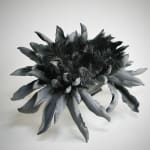Shingu Sayaka 新宮さやか Japanese, b. 1979
H23.5 × W38 × D37cm
Further images
-
(View a larger image of thumbnail 1
)

-
(View a larger image of thumbnail 2
)

-
(View a larger image of thumbnail 3
)

-
(View a larger image of thumbnail 4
)

-
(View a larger image of thumbnail 5
)

-
(View a larger image of thumbnail 6
)

-
(View a larger image of thumbnail 7
)

-
(View a larger image of thumbnail 8
)

-
(View a larger image of thumbnail 9
)

-
(View a larger image of thumbnail 10
)

-
(View a larger image of thumbnail 11
)

-
(View a larger image of thumbnail 12
)

Shingu Sayaka (born 1979) is a contemporary ceramic artist based in Osaka, Japan. After having graduated from the Osaka University of Arts in 2003, she joined an apprenticeship program at the Shigaraki Ceramic Cultural Park in Shiga, Japan, where she was deeply moved by the work of contemporary artist, Sugiura Yasuyoshi. Her work is celebrated for its naturalistic forms, particularly for her ceramic flower sculptures, which often are constructed from mixed clay with slip and glaze using intricate hand building and glazing methods that show great restraint in their craft and construction.
Shingu takes on floral motifs as a metaphor for impermanence, ephemerality, and fleeting beauty. She takes on a quintessentially Japanese aesthetic tradition which celebrates the ephemeral, and has quoted a celebrated verse by the 9th century female poet Ono no Komachi as a distillation of many of her themes:
花の色はうつりにけりないたづらにわが身世にふるながめせしまに
The flowers have withered,
Their color faded away,
While I spend my days in idle sorrow,
As the rains of my past life fall.
From the anthology of Waka poems, Hyakunin Isshu (百人一首)
Shingu’s sculptures showcase intricate, delicate craftsmanship, entirely hand-built from clay. At first glance, it's hard to believe the pieces are made of ceramic, as they evoke the realism of a cut flower, invoking the image of morning dew on silvery glazes on the petals, as well as the tiny stamens and pistils of a flower in bloom. Her pieces conjure a dual sense of impermanence: while her ceramic work is physically delicate, the image of the flower it represents remains eternally intact, never fading like a real bloom would.
Her work has received significant attention and awards, including selection for the 42nd Asahi Ceramic Art Exhibition and exhibitions at the Art Institute of Chicago, Kyoto Arts and Crafts Biennale (The Museum of Kyoto), The Portland Art Museum, and more.











